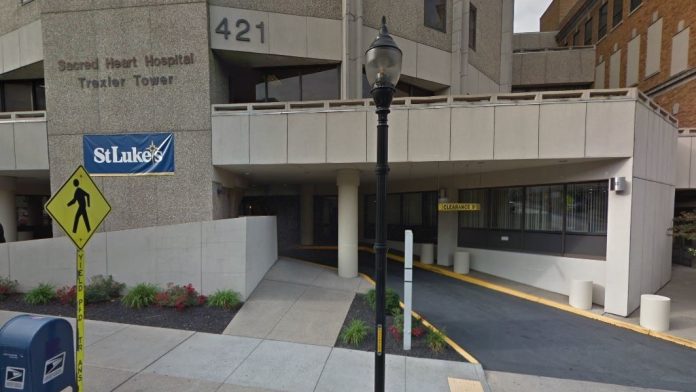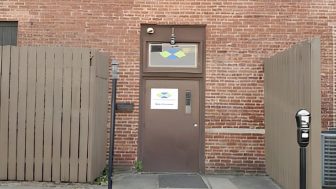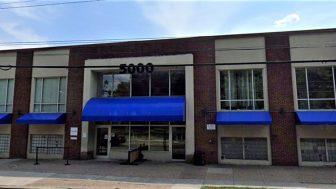St Lukes Behavioral Health Inpatient Adult Unit Allentown
421 West Chew Street
Allentown, PA 18102
Allentown, Pennsylvania
866-785-8537
Get Help Now - 215-258-4569
 Who Answers?
Who Answers?

About St Lukes Behavioral Health Inpatient Adult Unit Allentown
Amenities

Art Therapy
Art and music are mediums that connect with our feelings, making them a great recovery tool during addiction t...reatment. Studies show that combining art/music and drug rehab can have a greater therapeutic impact than drug rehab alone, as you’re able to access parts of your brain and body that you may not have access to during traditional talk therapy. Benefits of art/music therapy include lowering stress and anxiety, promoting healthy neurochemicals, and providing stress relief.Read More

Music Room
Music can be extremely therapeutic, serving as a valuable healing tool and an integrative feature of a holisti...c treatment plan. A music room offers a large number of outlets, including singing, playing musical instruments, and listening to music.Read More
Addiction Treatment Programs
Adult Program
Cognitive Behavioral Therapy (CBT)
Men's Rehab
Senior Drug & Alcohol Rehab
Women's Rehab
Teen & Adolescent Program
Adult Program
The Keystone State offers many resources for those struggling with substance use disorders. Each adult program in Pennsylvania provides individualized care, to meet people where they are and help them take the next step on their recovery journey.Cognitive Behavioral Therapy (CBT)
Cognitive behavioral therapy in Pennsylvania helps participants identify inaccurate thinking and learned patterns of negative behavior and how to change them. It gives participants the skills to relieve their symptoms without turning to substances.Men's Rehab
Men’s rehab in Pennsylvania can help men receive support from other men who understand their challenges. This provides a sense of camaraderie that relieves feelings of isolation.Senior Drug & Alcohol Rehab
Elderly rehab in Pennsylvania works with older adults who are facing addiction. Common services include management of chronic health conditions, case management, and education about prescription medications.Women's Rehab
Women’s rehab in Pennsylvania helps females struggling with substance use disorders build the skills necessary to maintain sobriety. Treatment is designed to help women stay on track for long-term recovery.Teen & Adolescent Program
A young adult program in Pennsylvania provides a comfortable, age-appropriate environment for treatment. These programs offer life skills education, individualized treatment, family therapy, and aftercare.Levels of Care
1
Inpatient Rehab
When first starting drug rehab in Pennsylvania, many individuals begin with inpatient rehab. This involves sta...ying at the facility 24/7 and receiving a variety of treatment methods that typically include group and individual counseling.Read More
2
Aftercare & Alumni Program
Following rehab, you can receive much-needed ongoing support through aftercare rehab in Pennsylvania. Services... may include financial planning, career guidance, legal advice, and other practical supports, as well as counseling and 12-step groups. Taking advantage of these resources greatly reduces the chance of relapse.Read More
3
Dual Diagnosis & Mental Health
Mental illness and substance abuse are so integrated that they must be treated together. Ignoring one and trea...ting the other doesn’t work. Dual diagnosis treatment in Pennsylvania effectively addresses both mental health and substance abuse disorders, for the best outcomes.Read More
Accreditations

SAMHSA

State License #:
920370Insurance
 Financial Aid
Financial Aid
Financial Aid: If you need help with paying for alcohol and drug rehab in Pennsylvania, financial aid may be a... good solution. Financial assistance options include grants, scholarships, non-profit programs, personal funding, and health insurance programs to help you manage the expense of substance abuse treatment.Read More
 Medicaid Accepted
Medicaid Accepted
If need help paying for alcohol and drug rehab in Pennsylvania, you may be eligible for Medicaid. Coverage thr...ough Medicaid may vary, but it can assist with the cost of alcohol and drug rehab, including detox, inpatient rehab, and more.Read More
 Medicare Accepted
Medicare Accepted
if you're eligible for Medicare, you may be able to get help to pay for the cost of alcohol and drug rehab in ...Pennsylvania. The amount of coverage will depend on many things, including whether you are seeking inpatient or outpatient treatment for substance abuse.Read More
 TRICARE
TRICARE
Administered by the Department of Defense, TRICARE offers comprehensive military health insurance plans for ac...tive and retired military members and their families. Similar to PPO programs offered by private insurance companies, TRICARE covers multiple levels of care for addiction treatment, including detox, inpatient rehab, and outpatient services.Read More
 Private Insurance
Private Insurance
Your private insurance may cover the cost of alcohol and drug rehab in Pennsylvania. The amount covered may de...pend on your policy and whether the treatment center is in-network or out-of-network. You may be left with some costs like a co-payment, or co-insurance. Check with your insurer for more information.Read More
 Self-Pay Options
Self-Pay Options
You have the choice to pay for your alcohol and drug rehab in Pennsylvania out-of-pocket, also called as self-...pay or private pay. This way, there are no restrictions placed on your access to treatment, courtesy of insurance companies. Payment methods include checks, personal loans, medical loans, credit cards, and many others.Read More
Contact St Lukes Behavioral Health Inpatient Adult Unit Allentown




